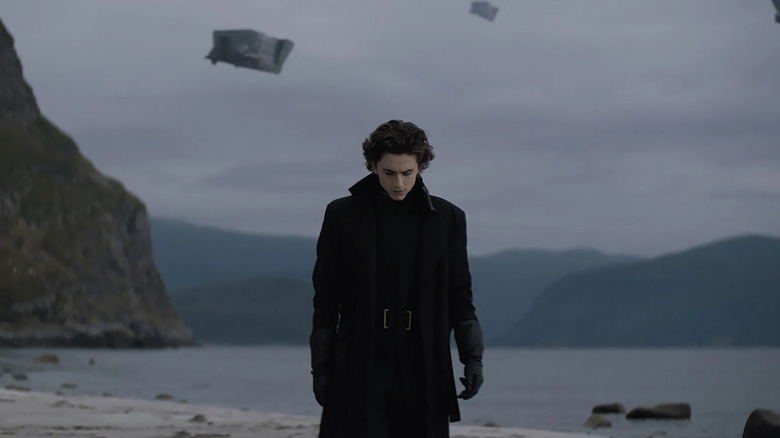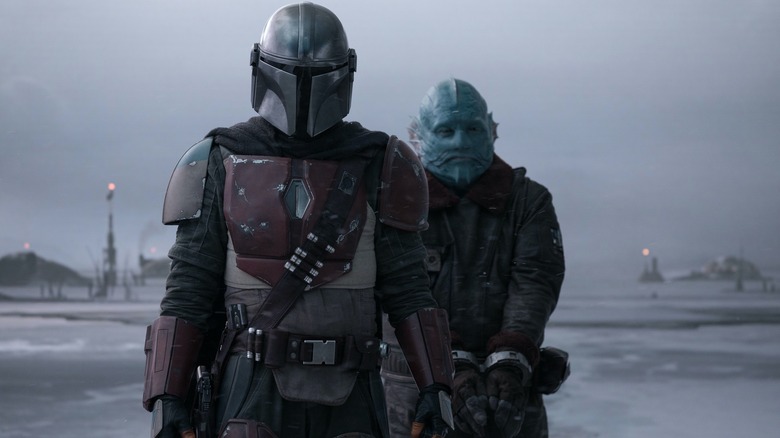Greig Fraser Just Won An Oscar For Dune, And He's One Of Our Best Modern Cinematographers
Greig Fraser just won an Oscar for Best Cinematography for "Dune," and boy is it well-deserved. The race for this category has been among the most competitive of the year — just look at the other nominees: "The Power of the Dog" (Ari Wegner), "Nightmare Alley" (Dan Laustsen), "West Side Story" (Janusz Kamiński), and "The Tragedy of Macbeth" (Bruno Delbonnel). But it's hard to argue with this victory.
Fraser's work on "Dune" is nothing short of spectacular, as his vision helped solidify Denis Villeneuve's rendition of Frank Herbert's galaxy-spanning saga. He brings the vast, sweeping ecology of Arrakis to life, introducing a fitting cinematic language to a complex, socio-politically rich saga.
This is Fraser's first Oscar win and second nomination in the category, his other nod being for his work on "Lion." Fraser accepted the award by thanking Villeneuve and other collaborators for allowing "a middle-aged man to play in the sand dunes for six months":
"Wow...Denis Villeneuve, sir, master, master Denis. He's brought a whole group of unknown actors together, to make an amazing movie, along with our lovely producers, thank you."
Why Fraser's work is so seminal
Fraser's "Dune" win arrives while his phenomenal work on Matt Reeves' "The Batman" can be seen in theaters. In that him, he helps bring a dark, gritty Gotham to life, majorly adding to the overall tone of the noir film. Fraser has helped enliven a host of films throughout his career, and one that emerges as especially interesting is Kathryn Bigelow's extraordinary "Zero Dark Thirty," which features a heart-thumping, harrowing, night-time raid shot using night vision technology.
This much-talked-about sequence would not have been possible without Fraser. The cinematographer has spoken about the nitty-gritties of the process in "Zero Dark Thirty," and the need to strike a balance between "being true to the subject" and being confident enough in one's own vision (via The Motion Pictures Association):
"You don't want to create anything overly dramatic when you don't need to, and you don't want to create anything less dramatic than necessary, either. It's about walking a very fine line of being true to the subject and source material, and also having enough confidence in what you're doing to realize that if you don't do anything fancy with the camera right now, it's actually going to improve the story. Or, if there's a time when you feel like you can be more dramatic with the camera, like during the scene taking down the character of the courier Faraj in the park or the raid at the end—you add those little visual flourishes."
Fraser went on to enrich the worlds of "Rogue One: A Star Wars Story" and "Lion," along with Adam McKay's 2018 political satire, "Vice." His work on "Rogue One" is worth noting, as the "Star Wars" entry was crafted in a tone and style that differed from the traditional entries in the franchise, possibly due to the use of the ALEXA 65 camera format, which helped add a sharper, three-dimension texture to the film. Fraser has also worked on a few episodes of "The Mandalorian," namely, the episodes "The Mandalorian," "The Sin," and "The Reckoning," helping widen the visual possibilities of the "Star Wars" universe. Fraser won the Primetime Emmy Award for Outstanding Cinematography in the Single-Camera Series (Half-Hour) category for his work on "The Mandalorian."
Apart from his Oscar win, Fraser has also won the American Society of Cinematographers Award for Outstanding Achievement in Cinematography in Theatrical Releases and received an Academy Award nomination for Best Cinematography and a BAFTA Award nomination.

